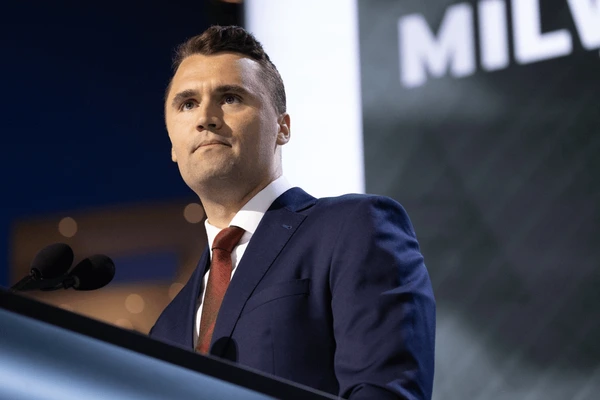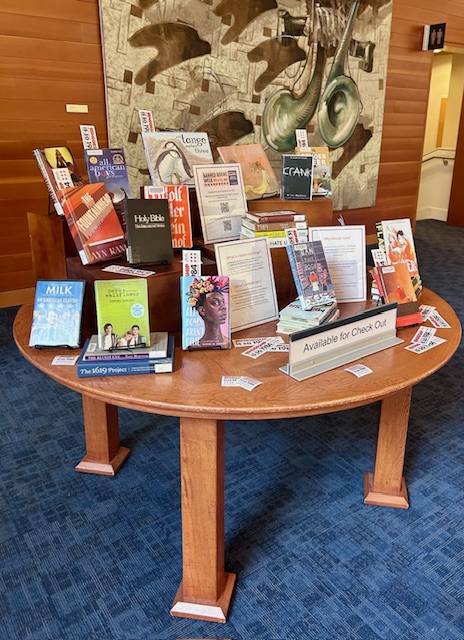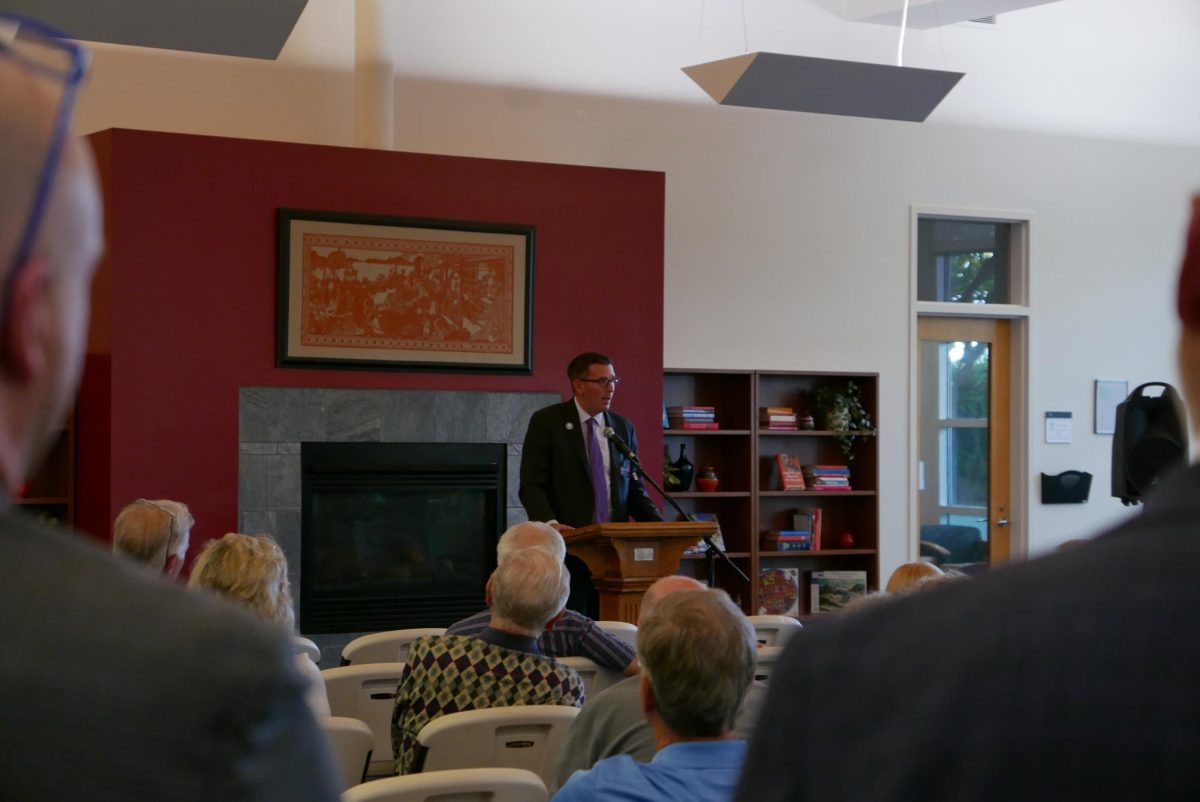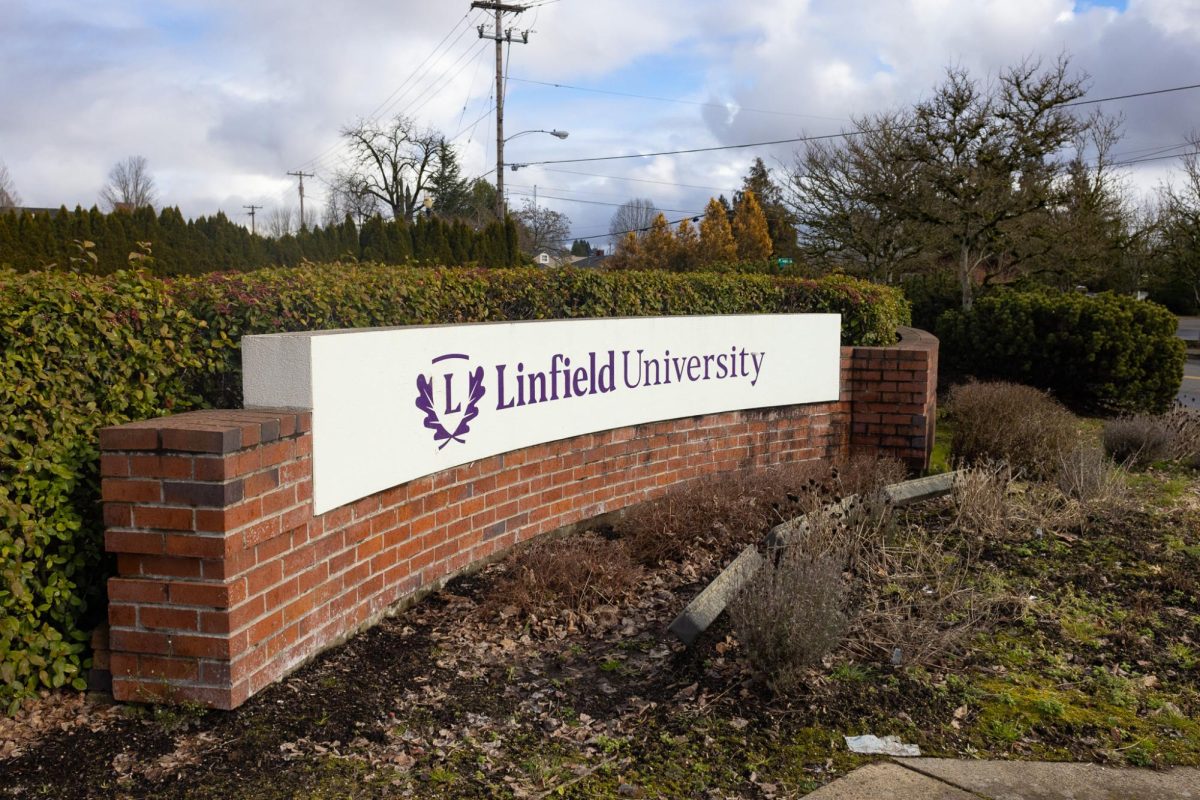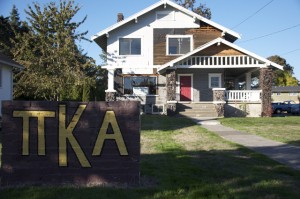
“We’re shifting toward a new era, like a new brand,” Pi Kappa Alpha President senior Jon Thompson said.
Interior demolition began a year ago, but the fraternity members have lived in alternative housing, called the Annexes, near the house for two years.
They were told to leave the house for safety reasons in 2008. Thompson said the school and the McMinnville fire marshal assessed the building and declared it unsafe and uninhabitable.
He said the entire interior will be redone, including everything from reworking electrical wiring and plumbing, to adding new bed frames to removing an oversized furnace.
“Before we started the remodel, there was an entire room dedicated to a furnace that no longer worked — that we weren’t allowed to use. There was an entire room dedicated to storing the fuel for that furnace,” Pi Kappa Alpha Vice President senior Scott Wickham said. “And now we can use those rooms as other things to better the living experience.”
Wickham said the project will cost close to $500,000.
Most of the wait resulted from fundraising problems.
Thompson said people were hesitant to donate because of the poor economic climate, and banks wouldn’t give loans because they were worried about a fraternity repaying the money.
But Pi Kappa Alpha alumni came to the rescue. While the current members could raise only $500 to $1,000 here and there, the alumni raised larger amounts. These alumni make up a group called the Housing Corp.
Wickham said the Housing Corp. called many alumni to gather investments.
“A few alumni started stepping up, saying I’ll put $10,000 here, $20,000 there. Then, next thing you know, people started saying $50,000; people started saying $100,000,” Thompson said. “A lot of the alumni knew that without a house, we were basically cut off, and they wanted to help.”
Thompson said he received an e-mail during the summer saying that a few alumni were willing to give triple-digit donations.
“Our focus is supposed to be our education; our focus here is to stay in school — to not worry about things like this. The alumni have done a good job of taking the reins,” he said. “The active [members] are …
blessed to not have to go and put that strain on our lives.”
The monetary commitment attracted the attention of the national Pi Kappa Alpha group, which subsequently promised a $150,000 to $175,000 loan toward the house’s completion, depending on how much the Linfield members raise in total.
Thompson said the construction is expected to be completed during the first week of Spring Semester.
The remodel will also include study space, Wickham said.
“With most fraternityhouses, kids move in because they want to be where the party is. But I think the way we’re designing it — we’re creating study rooms in the house,” he said. “Our number one goal is to have a nice place that people want to live in that is conducive to academia.”
Thompson said that the absence of a big, open space in the house encourages a positive environment to study instead of one that promotes partying.
A completed house means big benefits for the fraternity, especially when it comes to rush, which is a time during which Greek organizations recruit prospective members. The fraternity has 15 active members, but Thompson said the fraternity had more than 30 when he was a sophomore.
“When we have so little members, it’s tough going against Kappa Sigma, which has like 70 guys,” he said.
Wickman agreed, adding that recruitment concerns detracted from philanthropy and community service efforts.
Sophomore Brad Dupea, the fraternity’s active rush chair, said having a house will make recruitment
easier.
“If you have a common place to bring people to, it’s easier to get your name out,” he said.
In the past, the fraternity experienced trouble maintaining high membership, since many potential pledges are drawn toward the fraternities with houses, Thompson said. Part of the problem was that other fraternities would bad-mouth Pi Kappa Alpha, Wickham said.
“All the other organizations would say, ‘Don’t join ‘PIKE’; they don’t have a house,’” he said. “But now we’re going to have a house; we’re going to have a level playing field, and I think our recruitment numbers will go up.”
President of Theta Chi Fraternity senior Beau Slayton said in an e-mail that he is excited that Pi Kappa Alpha’s house is returning to use. He said Theta Chi will continue to recruit as usual but perhaps will become more creative in its recruitment approach.
“[We may] put more effort into checking on guys and trying to establish our relationship with them
early on,” Slayton said in an e-mail.
President of Kappa Sigma Fraternity junior Nick Irving said Pi Kappa Alpha’s improved house will strengthen Linfield’s Greek system overall, but he is not worried about recruitment.
“Young men worldwide have joined Kappa Sigma because we are the most preferred fraternity in the world, not because of what a house looks like,” Irving said in an e-mail. “Kappa Sigma will continue to recruit high caliber men into our brotherhood and remain the number one fraternity both on campus and worldwide.”
But Thompson said recruitment is a competitive time.
“Everybody was like, ‘Oh, they’ll never get it done, it’ll never happen,’” Thompson said about the renovations. “I just love it when other fraternities say, ‘Oh your house is getting done? Oh that’s great; that’s so awesome!’ When a few months ago it would have been …”
“[T]hem using it as a recruitment tool for themselves,” Wickham finished.
Having an established house will reaffirm the fraternity’s existence, too. Dupea said many people don’t know that Pi Kappa Alpha still exists at Linfield because people mentally connect fraternities to houses. Since Pi Kappa Alpha hasn’t had a livable house for social functions, people think the fraternity doesn’t exist, he said
“It shouldn’t even be about the house; it should be about the guys in the fraternity,” Thompson said. “It’s a shame that it comes down to the house — that the house is a major deciding point.”
Thompson said that without a house, potential members would only talk to other fraternities, but the new space will allow Pi Kappa Alpha to join the conversation.
The house will also make meetings for current members easier. Right now, the fraternity holds chapter meetings in the Annexes — cramming 15 members into a space designed for only six or seven people, Thompson said.
Also, unlike the other fraternity houses, the Pi Kappa Alpha house is an actual house, and not a dormitory-style abode. And, because of the fraternity’s small numbers, everyone in the group would be able to live in it.
Even when the fraternity numbers outgrow the house, members can live in the Annexes, Wickham said.
And the president and vice president are proud to have been a part of the project.
“My worst nightmare was that, when I would leave this school, that it [the fraternity] wouldn’t be around anymore,” Wickham said. “Knowing that you were part of the rebuilding process and bringing it back into the forefront of Greek Life — I think it’s a really nice thing.”
Thompson agreed.
“I’m happy that it’s not just three fraternities and a couple of guys without a house,” he said.
Kelley HungerfordEditor-in-chief
Kelley Hungerford can be reached at [email protected].

